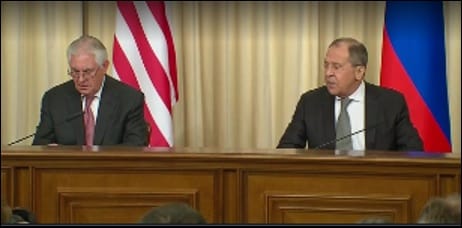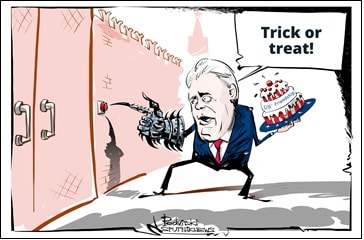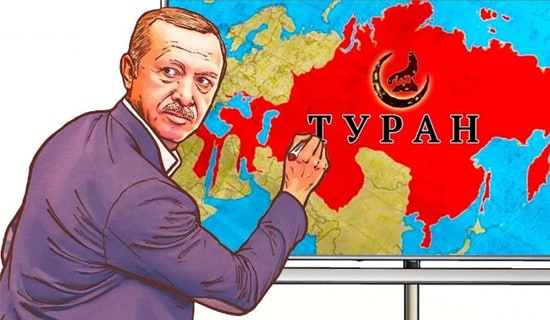U.S. Secretary of State Rex Tillerson's visit to Moscow on April 11-12, 2017 came against the backdrop of a recent U.S. missile strike on a Syrian airbase that was followed by political tensions between Russia and the U.S.[1] At the G7 meeting in Italy just prior to his trip to Moscow, Tillerson had stated: "I think it’s also worth thinking about Russia has [sic] really aligned itself with the Assad regime, the Iranians, and Hizbullah. Is that a long-term alliance that serves Russia’s interest, or would Russia prefer to realign with the United States, with other Western countries and Middle East countries who are seeking to resolve the Syrian crisis? We want to relieve the suffering of the Syrian people. We want to create a future for Syria that is stable and secure. And so Russia can be a part of that future and play an important role, or Russia can maintain its alliance with this group, which we believe is not going to serve Russia’s interest longer-term. But only Russia can answer that question."[2]
Commenting on Tillerson's words, Russia Foreign Ministry spokeswoman Maria Zakharova said: "It's useless to come to us with ultimatums, it's just counterproductive."[3] However, the meeting between Tillerson and Russian Foreign Minister Sergey Lavrov changed Russia's internal mood. Maxim Usim, columnist for the Russian daily Kommersant, noted that Tillerson's language was not confrontational and that this had enabled him to meet with Russian President Vladimir Putin.
The following are reactions to U.S. Secretary of State Tillerson's Moscow visit:

U.S. Secretary of State Rex Tillerson with Russian Foreign Minister Sergey Lavrov. (Source: State.gov)
Senator Kosachev: "The American Did Not Come With Absurd Proposals… None Of The Parties… Have A Desire To Further Exacerbate The Situation"
Russian Federation Council International Affairs Committee chairman Konstantin Kosachev wrote on his Facebook page: "The first impression is quite positive. No breakthrough occurred, and no one expected it. However, the two sides were able to avoid the temptation of the overstated expectations, and the modest results of the meeting are still positive." Kosachev stressed that a meaningful result was the Russian and U.S. commitment to maintaining the dialogue by "institutionalizing it in the format of special representatives."
He added: "The two sides now have a better understanding of the possible and impossible limits in the prospects for bilateral relations and in the interpretation of international problems. The Americans obviously did not come with some absurd proposals similar to exchanging (Syrian President Bashar Al-Assad) for G7 membership, Ukraine for Syria and so on, and also not only with moralizing and ultimatums."
He stressed: "Otherwise, the meeting with (Russian President Vladimir Putin) would have not taken place, as wasting time on empty words is not his style."
Kosachev also said that Russia "unambiguously confirmed its willingness to restore cooperation, provided that the two sides could do without the notorious American mentoring and arrogance. Anyway, none of the parties seems to have a desire to further exacerbate the situation, and everyone believes that it is not hopeless."
(Tass.com, April 13, 2017)

(Source: Sputniknews.com, April 12, 2017)
Kommersant Columnist: Tillerson's Moderate Language Enabled Meeting With Putin
Maxim Usim, a columnist for the Russian daily Kommersant, wrote that Tillerson's meeting with Russian Foreign Minister Sergey Lavrov was not confrontational, but rather business oriented. According to Usim, Tillerson avoided using harsh language regarding Russian policies, while Lavrov was reserved and diplomatic. The impression, wrote Usim, is that both sides want to minimize the damage to bilateral relations by "Trump's Syrian escapade," adding that the mere fact that Tillerson avoided "speaking in terms of sanctions and ultimatums" made the meeting with Russian President Vladimir Putin possible.
(Kommersant.ru, April 12, 2017)
Izvestia: "The First Attempt To Get Along May Be Considered Productive, Even If Not Fully Successful"
The Russian daily Izvestia summarized Tillerson's the visit as follows: "The most important thing is that during this very short but very intense visit the sides succeeded in reaching an agreement regarding further steps to be taken in order to get rid of the bilateral crisis. At the same time, the visit's message to the world was: The first attempt to 'get along' may be considered productive, even if not fully successful."
(Izvestia.ru, April 13, 2017)
Duma International Affairs Committee Chairman: "There Was No Ultimatum"
Duma International Affairs Committee chairman Leonid Slutsky stated: "One of the visit's results is the failed prognosis regarding some kinds of U.S. ultimatum. There was no ultimatum. On the contrary, the sides agreed on establishing a joint group in order to look into the most complicated questions of the Russia-U.S. agenda."
(Tass.com, April 12, 2017)

Tillerson: "We want to relieve the suffering of the Iraq... Ouch... Liby... Ouch... Syrian people." The cartoon was published prior to Tillerson's visit. (Ria.ru, April 11, 2017)
Senator Klintzevich: "It Is Now Obvious That Tillerson's Visit Was Not A Waste Of Time"
Senator Franz Klintsevich, deputy chair of the Federation Council Defense and Security Committee, commented: "It is now obvious that Tillerson's visit was not a waste of time. Reiterating the mutual commitment to fight international terror is the maximum which could have been achieved, given the recent negative developments. At the moment, it's quite stupid to discuss who won and who lost as the result of the meeting, who saved face and who lost face... The sides opted for mutual compromise, but as a result they secured the chance to really cooperate against ISIS. That's what is really important."
(Tass.com, April 12, 2017)
Ivan Melnikov, Communist Party, Vice-speaker of Duma: "Given the unpredicted U.S. actions influencing the situation, we may judge only by the deeds rather than by the words and intentions. Mr. Tillerson leaves good impression, and speaks respectfully about Russia as a superpower – but what if the principles of the American imperialism remain in force?"
(Tass.com, April 12, 2017)
Ruling Party United Russia MP Sergey Zheleznyak: "The meeting demonstrated that despite the differences, our countries are interested in cooperation concerning various areas – solving burning international crises as well as renewing economic cooperation. We'll see how Tillerson's words in Moscow will coincide with the administration's actions and then we’ll draw our conclusions."
(Tass.com, April 12, 2017)
Senator Pushkov: The Meeting Was "The Start Of Dialogue"
Senator Alexey Pushkov tweeted: "Frontal confrontation has been cancelled. Russia and the U.S. proceed from the war of words towards exchanging opinions, controlling the differences and cautious dialogue."
(Twitter.com/Alexey_Pushkov, April 12, 2017)
Pushkov also tweeted: "The summary of the negotiations in Moscow: Not yet a breakthrough, but the start of dialogue and an attempt to strengthen the mutual trust after serious tensions erupted."
(Twitter.com/Alexey_Pushkov, April 12, 2017)
According to a Russian Defense Ministry source quoted in the Vedomosti newspaper, Moscow is ready for dialogue and does not consider a dangerous direct confrontation with the U.S. to be inevitable. Simultaneously, Moscow demonstrates its readiness to strengthen its military positions in Syria – this is the message delivered by the deployment of the frigate Admiral Grigorovich to the Mediterranean.
(Vedomosti.ru, April 13, 2017)
[1] See MEMRI Special Dispatch No. 6866, Russia's Reactions To The U.S. Missile Strike In Syria, April 10, 2017.
[2] State.gov, April 11, 2017.
[3] Ria.ru, April 12, 2017.





